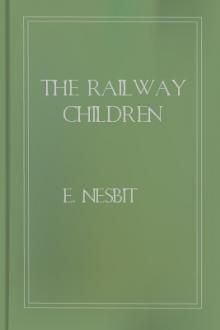The Railway Children, E. Nesbit [book series for 12 year olds .txt] 📗

- Author: E. Nesbit
Book online «The Railway Children, E. Nesbit [book series for 12 year olds .txt] 📗». Author E. Nesbit
Jim could never understand how Mother could have been clever enough to do it. To the others it seemed nice, but natural. You see they had always been used to having a mother who could write verses just like the way people talk, even to the shocking expression at the end of the rhyme, which was Jim's very own.
Jim taught Peter to play chess and draughts and dominoes, and altogether it was a nice quiet time.
Only Jim's leg got better and better, and a general feeling began to spring up among Bobbie, Peter, and Phyllis that something ought to be done to amuse him; not just games, but something really handsome. But it was extraordinarily difficult to think of anything.
“It's no good,” said Peter, when all of them had thought and thought till their heads felt quite heavy and swollen; “if we can't think of anything to amuse him, we just can't, and there's an end of it. Perhaps something will just happen of its own accord that he'll like.”
“Things DO happen by themselves sometimes, without your making them,” said Phyllis, rather as though, usually, everything that happened in the world was her doing.
“I wish something would happen,” said Bobbie, dreamily, “something wonderful.”
And something wonderful did happen exactly four days after she had said this. I wish I could say it was three days after, because in fairy tales it is always three days after that things happen. But this is not a fairy story, and besides, it really was four and not three, and I am nothing if not strictly truthful.
They seemed to be hardly Railway children at all in those days, and as the days went on each had an uneasy feeling about this which Phyllis expressed one day.
“I wonder if the Railway misses us,” she said, plaintively. “We never go to see it now.”
“It seems ungrateful,” said Bobbie; “we loved it so when we hadn't anyone else to play with.”
“Perks is always coming up to ask after Jim,” said Peter, “and the signalman's little boy is better. He told me so.”
“I didn't mean the people,” explained Phyllis; “I meant the dear Railway itself.”
“The thing I don't like,” said Bobbie, on this fourth day, which was a Tuesday, “is our having stopped waving to the 9.15 and sending our love to Father by it.”
“Let's begin again,” said Phyllis. And they did.
Somehow the change of everything that was made by having servants in the house and Mother not doing any writing, made the time seem extremely long since that strange morning at the beginning of things, when they had got up so early and burnt the bottom out of the kettle and had apple pie for breakfast and first seen the Railway.
It was September now, and the turf on the slope to the Railway was dry and crisp. Little long grass spikes stood up like bits of gold wire, frail blue harebells trembled on their tough, slender stalks, Gipsy roses opened wide and flat their lilac-coloured discs, and the golden stars of St. John's Wort shone at the edges of the pool that lay halfway to the Railway. Bobbie gathered a generous handful of the flowers and thought how pretty they would look lying on the green-and-pink blanket of silk-waste that now covered Jim's poor broken leg.
“Hurry up,” said Peter, “or we shall miss the 9.15!”
“I can't hurry more than I am doing,” said Phyllis. “Oh, bother it! My bootlace has come undone AGAIN!”
“When you're married,” said Peter, “your bootlace will come undone going up the church aisle, and your man that you're going to get married to will tumble over it and smash his nose in on the ornamented pavement; and then you'll say you won't marry him, and you'll have to be an old maid.”
“I shan't,” said Phyllis. “I'd much rather marry a man with his nose smashed in than not marry anybody.”
“It would be horrid to marry a man with a smashed nose, all the same,” went on Bobbie. “He wouldn't be able to smell the flowers at the wedding. Wouldn't that be awful!”
“Bother the flowers at the wedding!” cried Peter. “Look! the signal's down. We must run!”
They ran. And once more they waved their handkerchiefs, without at all minding whether the handkerchiefs were clean or not, to the 9.15.
“Take our love to Father!” cried Bobbie. And the others, too, shouted:—
“Take our love to Father!”
The old gentleman waved from his first-class carriage window. Quite violently he waved. And there was nothing odd in that, for he always had waved. But what was really remarkable was that from every window handkerchiefs fluttered, newspapers signalled, hands waved wildly. The train swept by with a rustle and roar, the little pebbles jumped and danced under it as it passed, and the children were left looking at each other.
“Well!” said Peter.
“WELL!” said Bobbie.
“WELL!” said Phyllis.
“Whatever on earth does that mean?” asked Peter, but he did not expect any answer.
“I don't know,” said Bobbie. “Perhaps the old gentleman told the people at his station to look out for us and wave. He knew we should like it!”





Comments (0)